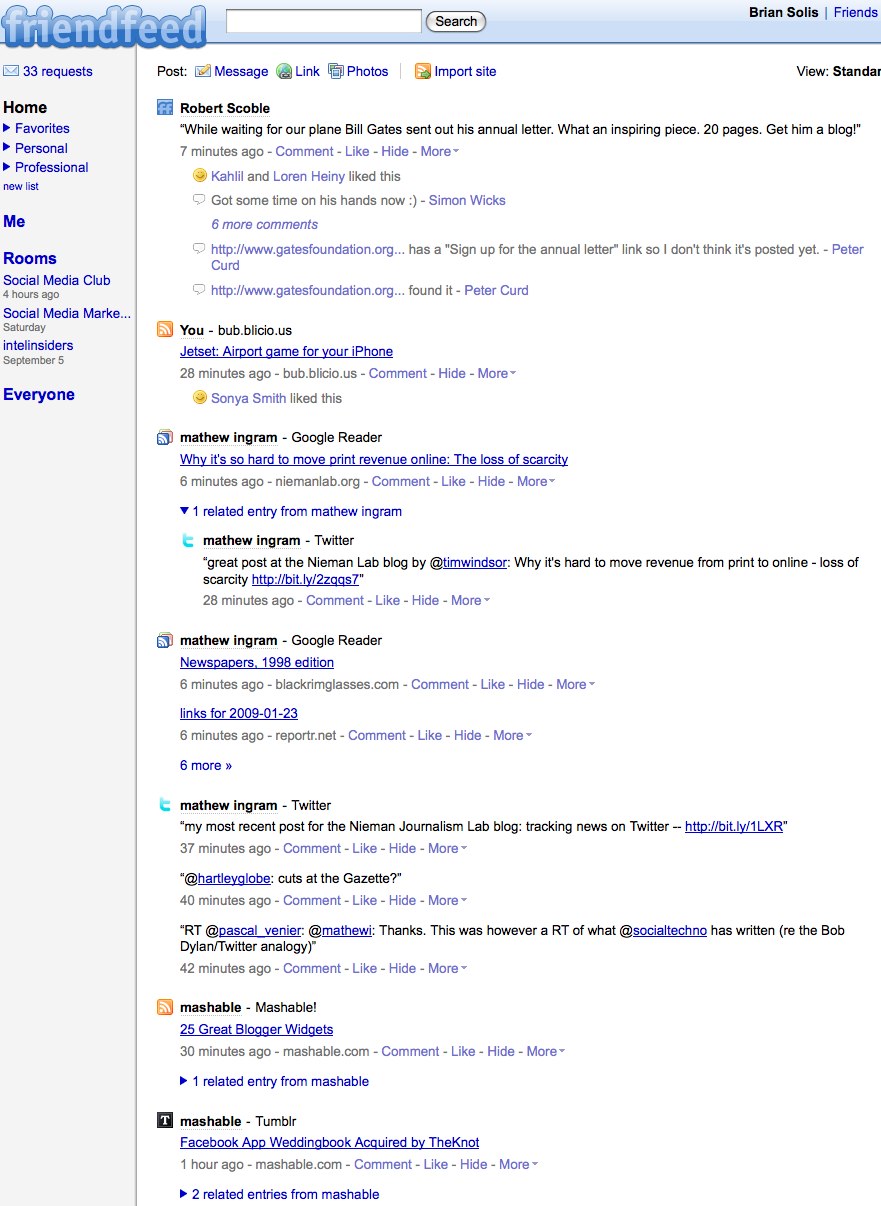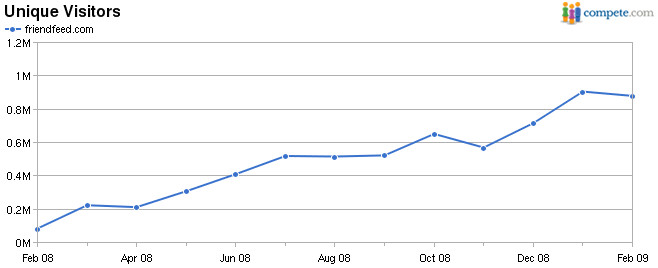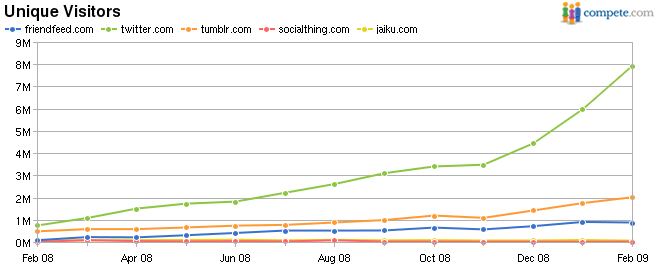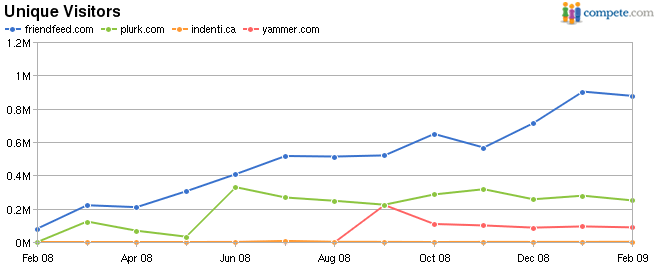
I recently discussed the viability of Twitter evolving beyond a micro community into a standardized platform for macro conversations. It’s certainly the path Facebook is traversing. And, both are making significant progress in the race to syndicate and aggregate the discussions that are important to us within our respective social networks.
There is another emerging platform worth discussing as it is quietly growing into an alternative solution to the disparate communities that are pervasive throughout the social web.
Ladies and gentlemen, add FriendFeed to your radar for listening, participation, and relationship building.
Defining FriendFeed is easier said than done. In fact, it’s less of a competitor to Twitter and more of a vertical threat to Facebook’s prized News Feed. The News Feed feature in Facebook is considered the central nervous system to the social graph. It powers conversations, connections, and collaboration. As Facebook Connect “connects” you and your social graph across the Web, it will increase in value as it aggregates all outside activity into one centralized stream for your friends, and friends of friends, to review, interpret, and respond. Also, don’t rule out an acquisition of Twitter either.
FriendFeed is one of the most prominent examples of a dedicated lifestream (brandstream). It channels your social activity and also that of your social graph into one simplified river of relevance. As new items appear in the stream, it invites bookmarking and threaded conversations that promote dialog. For example, you can import activity from flickr, youtube, twitter, backtype, blogs, Last.fm, Seesmic, Upcoming, LinkedIn, Yelp, Amazon, Picasa, Delicious, StumbleUpon, Digg, Reddit, Disqus, and 12 seconds. The growing list of services currently sits at 60, but technically you can integrate any service that generates an RSS feed. Most important is FriendFeed’s ability to port your Facebook status into your stream. Technically, you can now host, contribute to and participate in a more comprehensive “news feed” with the potential of reaching a far greater, or perhaps focused and dedicated audience of people who either aren’t on Facebook or prefer something different.

FriendFeed is also unique in that it offers custom rooms to host and join dedicated conversations related to any given topic. Your stream can also export to websites, outside communities, blogs and social profiles.
We celebrated Twitter’s rise to 4.5 million uniques in just over two years, which was enough to surpass Digg’s highly regarded traffic milestone. In less than a year, FriendFeed is nearing one million unique visitors, representing a 3,170% increase.

When compared to other social aggregation and lifestream services, FriendFeed’s trajectory is incredibly promising. You’ll also note that the category represented through the following services is also on the rise, with Tumblr at 1.4 million unique visitors, AOL’s SocialThing realizing 186% annual growth and Google’s Jaiku open micro community platform is still on the rise with a 33% increase over the last year..

If you compare FriendFeed to other micro communities, it appears to be the only platform that is not only growing, but also cultivating an active and significant user base. Plurk is the largest alternative micro community with 256,000 unique visitors and Yammer places a distant third at 86,000.

FriendFeed will only continue to increase in significance, broadening its reach, expanding its user base, and diversifying its user base from early adopters to mainstream market catalysts over the next year. This momentum will continue to be fueled by the addition of new and popular services combined with the dedicated evangelism and amplified awareness generated by influential (and passionate) users such as Robert Scoble, Louis Gray, Chris Brogan, Laura Fitton, Michael Arrington, Dan Farber, Chris Messina, Brian Oberkirch, Loic Le Meur, and Dave Winer. And, it’s not just the usual voices who will propel FriendFeed as a viable conversation platform, it extends to the many, many others who are authoritative and trusted within their dedicated spheres of influence and reach.
I’d love to hear your views, opinions, and predictions…
Related reading on PR 2.0:
– The Poetry of Social Networking to Court Customers and Invest in Relationships
– Top 40 Must Read Posts on PR 2.0 in 2008
– Twitter Tools for Community and Communications Professionals
– The State of Social Media 2008
– The Social Revolution is Our Industrial Revolution
– The Essential Guide to Social Media
– The Social Media Manifesto
– Introducing The Conversation Prism





For geeks like us, perhaps. But most people don’t take the time to discuss and re-discuss every mundane detail like we do 😀
Political fanatics visit 3 or 4 political blogs, and the discussion is there. They have no need to travel elsewhere. That’s my test for technology these days…is this something my mom would use?
As it stands, FriendFeed would be useless for her.
Great post, Mr. B!
Have heard of FF before but you may just be the one who persuades me to check it out further.
Thanks for the info.
Keep the faith and keep being you!
~Ronald
TrueBeliever & HopeDealer
Thanks Brian. I like Twitter and Facebook, but for various reasons I’ll start to use my existing FriendFeed account more in 2009.
A few months ago, I wrote about the “post-geekdomiant Twitterverse” (http://tr.im/postgeekdom) on Chris Brogan’s blog. That’s happening now. Will it happen for FF in 2009?
Nice read of the future. I also think that FF is onto something as their model is more ‘open’ than many other platform. I just wish that they would be more user friendly, it is complex to navigate its interface where Facebook and Twitter have made it dumbed down simple. It needs to become more intuitive. LifeStream / plumbing is definitely what we’ve been using it for but not to stay glued to it like Twitter of Facebook.
“the next” ? how about the current 😉
I think the reason FriendFeed has been such a great destination is because of its superior threading capabilities. It is impossible on Twitter to follow conversations fluidly. This is the inherent flaw that will render it useless eventually.
There are other reasons why Friendfeed is great. That said, the major influencers still tend to live on Twitter and/or some alternate Twitter platform. So if they’re not having conversations on Friendfeed and engaging there, it will have a problem taking the next step.
Brian:
I agree that Friendfeed is very well positioned to become one of the dominant social aggregators.
However, in order for it to truly distinguish itself from other “closed” aggregators, like Facebook, I’d like to see it become an open platform.
Specifically, I think that Friendfeed should become an OpenID “Provider” which offers it’s users the ability to register a custom Identifier (sub-domain which the user already owns).
OpenID is mildly interesting as a universal login but it is extremely interesting when used as a pre-validated domain which becomes one’s central “social hub” on the internet.
Friendfeed is already 3/4th of the way there already. The “problem” is that we are building our “social hubs” on a domain which someone else (i.e. Friendfeed) owns.
What would be better is if you could register an OpenID “identifier” (e.g. http://openid.briansolis.com) through your Friendfeed account.
If YOU own your “social aggregator” domain you have semi-portability.
Now, of course, many companies, like Friendfeed or Facebook, think that they will increase loyalty through NOT giving you the option of leaving. It’s a false sense of security. Ask Freindster or MySpace.
WordPress.com offers custom domains as an add-on and Google Apps is perhaps the best example. You can “hang” Gmail, Google Docs, Calendar, etc. off of a domain of your own.
Were Friendfeed to embrace OpenID for the purpose you suggested both services could be big winners and Friendfeed might demonstrate that social aggregators actually have more value than social networks.
Watch-out Facebook.
FriendFeed rocks the Casbah.
It's the most comprehensive real time facilitator of collective intelligence I've seen so far. According to Don Tapscott (Wikinomics) in order for this concept to happen 4 principals need to exist: openness, peering, sharing, & acting globally. FF has all of these but perhaps most importantly, as Brian mentions, the quality of that collective comes from the influential thought leaders avidly using the platform. For these reasons and many more I'm a huge fan.
OK, but that’s my limit. Friendfeed, facebook, twitter, email, sms, cell phone, land line, snail mail–I’m not adding anymore. If there was sand here, I’d lay down a line.
2008, early, it was pretty cool .. now it is too diluted
FriendFeed is way up there. Tracking of the links to my blog, FriendFeed is at the top of sources that link to my blog. Twitter is non-existent, and both Facebook and LinkedIn are useful. Based on these numbers (YMMV), just about anyone following me on Twitter is getting the feed through FriendFeed rather than through Twitter these days.
If you are “all over the place” on the social networks, etc., it is a bit of a shock at first to put yourself together on FriendFeed. A very interesting self-reflection. And then, it is great to see the value for yourself and those you follow.
FF is an amazing tool. It is an aggregator for all of your blogs and feeds. And by using the ROOMS features you can build custom ROOMS to hold all your important groupings of RSS feeds. (Example: All of Forrester bloggers and research press releases in one room and thus one FEED.)
I have been working on a concept of creating an uber browser using FriendFeed on FireFox. Thus FFoFF.
Thanks for spreading the word. And tools are popping up to help you sync (discover and add) your friends from other services to twitter.
As a non-user of social networking sites that put me ‘out there’, I was sceptical at first, but amongst a closed group of family and friends for the last year Friendfeed has proved a brilliant way of keeping in touch.
The fact that you can add photos and links means they know what you are thinking, what you are interested in and what you are up to, in reasonably sized chunks.
I’ve just joined Twitter. It’s fun (substantively down to the presence of Stephen Fry, a compulsive tweeter) but it’s just now got FF’s flexibility, and feels like a toy rather than a tool.
As someone who is currently studying to receive his Masters in PR, and comes from an acting background, a lot of this is new to me.
I love your blog Brian.
But I am interested to know what you all think the advantage to being on multiple social network sites is, as opposed to just choosing one and going with that?
Wouldn’t you basically end up having the same network of friends, family and colleagues on all the sites, if you had multiple?
Jeremy, interesting observation, “But I am interested to know what you all think the advantage to being on multiple social network sites is, as opposed to just choosing one and going with that? Wouldn’t you basically end up having the same network of friends, family and colleagues on all the sites, if you had multiple?”
I think there are different ways of looking at this…as an individual and as a connector between companies and consumers. The latter requires participation in all of the communities where your customers are interacting.
Great post, definitely look forward to reading some more quality articles in the future. I myself am involved heavily in SEO and search marketing and am always looking for new ways to branch out.
Although FF is a great tool I think it may be “stuck in the middle”. One side it is competing against the FB newsfeed and on the other Twitter. FF’s functionality is slightly superior in both regards but I am unsure if it does it better enough to displace people from their current destinations. It will definitely be interesting to see if it can come up with a killer value prop for those of us who only use 2-3 social media sites.
Adam
bitsandbids.wordpress.com
FriendFeed’s growth is currently being driven by technical and social media types who need aggregation because they have multiple streams. However, I think its real competition will be Facebook Connect. After all, why go to a third party site when you can pull everything into Facebook?
FriendFeed’s commenting feature is actually a bit of a pain – because it’s generally one way communication i.e. it aggregates, the discussion is split away from Twitter, a blog, Facebook or wherever the original source is.
– David
4tm-services.com
FriendFeed has less users today than it did last October, according to Comscore. Co-founder Paul Buchheit says that isn’t accurate (and I believe him), but it’s clear that the service hasn’t grown much in the last few months.
It makes me sad how FF is loosing the PR war to get users to convert. It’s such a superior experience. Perhaps Google WAVE will vaccum them up. They’re mainly ex-Googs anyway.
FriendFeed is a service that makes it easy to share with friends online. It offers a fun and interactive way to discover and discuss information among friends.
FriendFeed is a service that makes it easy to share with friends online. It offers a fun and interactive way to discover and discuss information among friends.